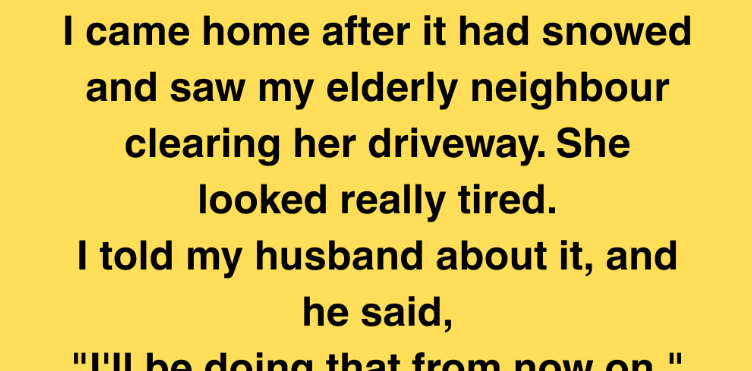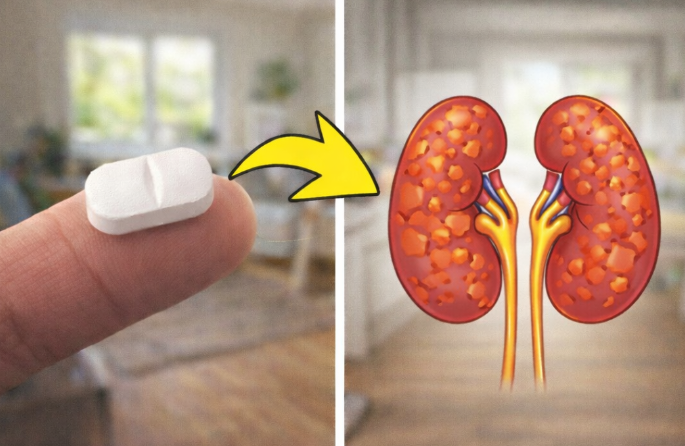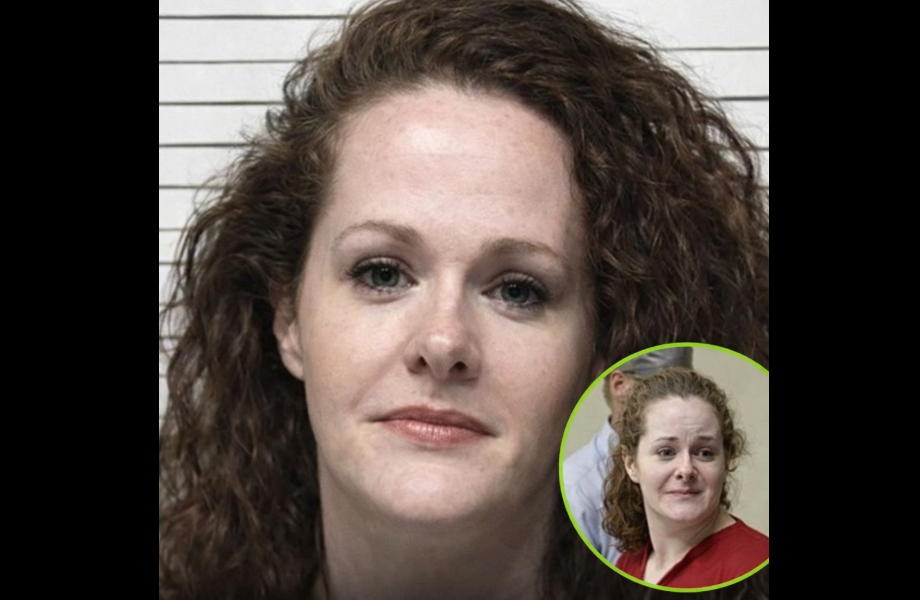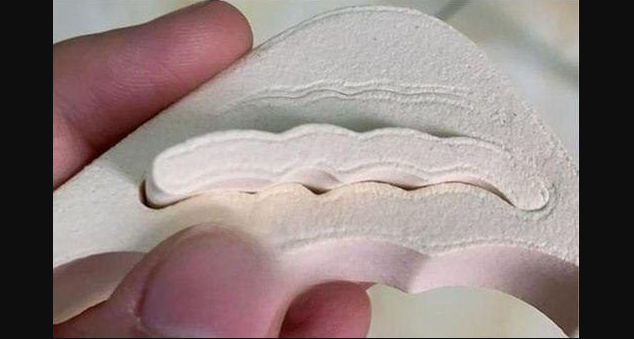I returned home after a snowfall and noticed my elderly neighbor, Mrs. Felicita Aguilar, struggling to clear her driveway. She appeared exhausted, her movements slow and labored. I shared this with my husband, Renan, who responded,
“I’ll take care of her driveway from now on.”
Four years later, she caught us in the act. I braced myself, expecting her to be upset since we were on her property without permission. Instead, she smiled warmly and said,
“Looks like you two finally got caught red-handed.”
I stood there, shovel in hand, surprised. Renan paused behind me, leaning on his shovel. It was 6 a.m. in mid-January, and we’d been quietly clearing her driveway before work whenever snow fell. Her long, cracked concrete driveway sloped downward, turning treacherous in winter.
The first year, we tried knocking to offer our help, but she never answered. We figured she was too proud or didn’t want to trouble anyone. So, we began clearing her driveway and porch early in the morning, slipping back home before our kids woke up.
She must have noticed. Snow doesn’t disappear on its own after every storm. Yet, she never mentioned it—until that morning.
She stood at the top of her steps, wrapped in a robe older than I was, holding a chipped coffee mug. “Come inside,” she invited. “I’ve got banana bread.”
Renan and I exchanged puzzled glances but followed her.
We knew her as Mrs. Felicita Aguilar, though she insisted we call her Feli. For seven years, she’d simply been “our neighbor.”
Her home smelled of oranges and aged支4.7.2 old books. Lace doilies adorned every surface, and one wall displayed family photos, though few faces appeared more than once.
“Sit down,” she said, gesturing to a plastic-covered couch. “You’ve been so kind to me. It’s time I returned the favor.”
We tried to brush it off, saying it was no trouble, but she dismissed our protests and served us warm banana bread on mismatched plates, handling each slice with care.
“You know,” she said, passing us the bread, “you two remind me of someone.”
“Who?” I asked, curious.
She gazed out the window. “My son and his wife. Before she left him.”
Renan and I nodded politely. We hadn’t known she had a son.
“He moved away,” she continued. “Lives in Nevada now. I haven’t seen him in thirteen years. Haven’t seen my granddaughter since she was two.”
Her tone was matter-of-fact, not seeking sympathy, just stating the truth.
We stayed for an hour, listening as she spoke of her late husband, her garden, and the church that stopped delivering communion after COVID.
After that morning, our connection grew.
Renan began mowing her lawn each spring. I brought her soup when she fell ill. Feli taught our daughter, Lia, piano lessons.
She showed her gratitude in small, thoughtful ways—a jar of guava jam, a note in our mailbox, a knitted scarf she handed me with a smile, saying, “You’ve got good shoulders. Show them off.”
One day, she gave Renan an old record player. “My husband’s,” she said simply. “Better in your hands than in a box.”
Renan, usually reserved, accepted it with reverence, as if it were a cherished relic.
Then came the envelope.
It appeared in our mailbox in early June, unstamped, with “For the Gutierrez Family” written in elegant cursive. Inside was a single line:
“Please don’t sell the house until you talk to me.”
I hurried next door.
Feli looked calm when she answered the door, but her hands trembled. She invited me in, and I noticed a suitcase by the couch.
“I think it’s time I go see him,” she said.
“Your son?” I asked.
She nodded. “We’ve said things I can barely recall. But maybe there’s still time.”
I didn’t know what to say, so I just held her hand gently.
Two days later, she left, asking us to water her ferns and take anything we wanted from her fridge.
Weeks passed without a word. Concerned, I dialed the number she’d scribbled on the back of her banana bread recipe card.
A woman answered. “Hi, I’m calling for Mrs. Aguilar?”
Silence. Then: “Who is this?”
I explained that we were her neighbors of many years.
“This is Maria,” the woman said. “I’m her granddaughter.”
My heart leapt. “She told us about you,” I said. “She mentioned not seeing you since you were little.”
Maria paused. “She’s here,” she said. “But she’s not doing well.”
She passed the phone to someone else—Feli(mp4-4.8.2 Mauro, her son.
His voice sounded weary, older than I’d imagined. “She had a stroke on the flight,” he explained. “They got her to a hospital, but it’s been hard.”
I asked if we could visit. After a moment’s hesitation, he gave me the address.
We flew out that weekend, bringing Lia along.
Feli looked frail, her speech slightly slurred, but her smile was radiant when she saw us, as if she’d been waiting for years.
She reached out, touching Renan’s face like he was kin, saying our names slowly but clearly.
Mauro stood in the doorway, arms crossed, observing quietly.
We spent the night in a nearby motel. The next morning, Maria invited us for breakfast.
Their home was filled with boxes—doilies, tins, letters Feli had sent over the years.
Maria showed us a photo album. One picture was from Lia’s last piano recital. “She sent us this,” Maria said. “We didn’t know who the girl was.”
Renan smiled. “That’s our daughter.”
Something softened in Mauro’s expression, like a long-closed door beginning to open.
He’d harbored resentment for years, over family disputes and old wounds—grievances we couldn’t fully grasp.
But seeing how Feli treated us, he said, “Maybe I missed something.”
Before we left, he embraced his mother—the first time in over a decade.
Two months later, Feli passed away.
A letter from a lawyer arrived, informing us she’d left us something.
Not money or jewelry—but her house.
We were stunned. The lawyer confirmed her will had been updated three weeks before her trip.
A copy was tucked inside the record player.
We visited her home, tears in our eyes. It was just as she’d left it, with the scarf she’d knitted me draped over a chair.
A note was taped to the fridge:
“Don’t keep this if it feels heavy. But if it feels like home, then I did right.”
After discussions with Mauro and Maria, we decided to sell the house and share the proceeds with them.
Maria cried, saying her grandmother would have approved.
We kept the record player, though. It sits in our living room, playing her husband’s jazz records every Saturday as we make pancakes.
Sometimes, we clear other neighbors’ driveways quietly, without knocking.
Small acts of kindness can mean the world to someone.
You never know what’s in someone’s heart until they open it to you.
If this story touched you or reminded you of a special neighbor, please share it. You never know who might need to hear it.






